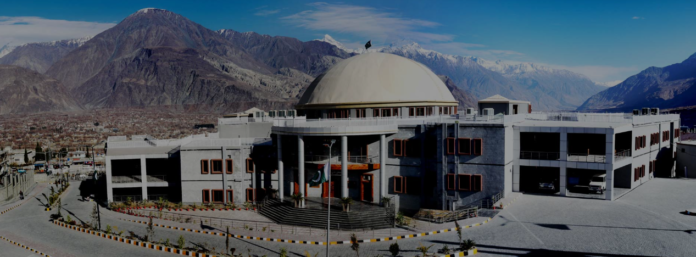The assembly is the most important and prestigious institution in any democratic system, established for legislation, resolving public issues, and overseeing government performance. The Gilgit-Baltistan Assembly was formed for these purposes and, after progressing through various stages, was named “Gilgit-Baltistan Assembly” in 2018 to present public issues on its platform and to enact serious and balanced legislation for their resolution. Unfortunately, at times, the environment in the Gilgit-Baltistan Assembly presents a scene that is entirely contrary to the spirit of democracy and the dignity of the assembly.
The disputes, insults, and uproar among elected representatives not only damage their credibility in the eyes of the public but also undermine the dignity of such an important forum. In today’s modern era, all disputes, fights, scuffles, insults, and uncivil behaviors of assembly members become video clips that spread across social media worldwide, ridiculing the assembly members and the entire Gilgit-Baltistan.
I have been observing the environment of the Gilgit Assembly for several years. Sometimes someone threatens to blow up the assembly, while another sings that the assembly will be locked. Such spectacles are witnessed in every session. In these circumstances, it would be appropriate to say, “Dear elders! This is an assembly, not a fish market!”
The primary purpose of the assembly is to deliberate on public issues, create laws, and review government performance. This forum guarantees that the representation of the public is done correctly and that appropriate legislation is enacted to resolve their issues. Some key objectives and responsibilities of the assembly are as follows:
Legislation:
Creating new laws for the improvement of the region and public welfare, and making necessary amendments to old laws.
Review of Government Policies:
Monitoring the performance of government projects and policies and providing suggestions for reforms.
Approval of the Budget:
Approving the budget for the proper use of public resources and overseeing its implementation.
Discussion on Public Issues:
The assembly discusses various public issues such as law and order, inflation, unemployment, and energy problems. The aim of these discussions is to highlight issues and propose effective measures for their resolution.
Accountability of Ministers:
The assembly questions ministers about their departments and holds them accountable to ensure better governance in the public interest.
Oversight of Administrative Matters:
The assembly monitors the performance of various government institutions and departments to ensure they fulfill their duties correctly and provide better services to the public.
Formation of National Policies:
The assembly formulates various policies necessary for the development of the country and province, such as industrial policy, educational policy, and agricultural policy.
Investigations and Committees:
The assembly conducts investigations into various issues through special committees, such as matters of corruption or the performance review of significant national projects.
Public Petitions and Complaints:
The assembly considers public petitions and complaints and takes steps to address them.
Additionally, there are many important tasks that assembly members must perform.
The dignity and sanctity of the assembly demand that its members adopt politeness, patience, and seriousness in their behavior. The public has elected them to be their voice and protect their rights, not to escalate personal disputes and political differences and turn the assembly into a battleground.
If assembly members disagree on a law, they have the full right to express their opinion, but this disagreement should be presented with politeness and reasoning. To maintain the dignity of the assembly, it is essential that every disagreement is heard with respect, and members should try to understand each other’s points instead of making personal attacks.
History has many examples where political leaders have demonstrated politeness and dignity despite their severe differences. For instance, there were clear ideological differences between Quaid-e-Azam Muhammad Ali Jinnah and Pandit Jawaharlal Nehru, but both leaders presented their disagreements politely and never resorted to personal attacks.
Another example is the British Parliament, where there are intense political differences between the ruling and opposition parties; however, a certain level of politeness and dignity is always maintained in the parliament. Members in the British Parliament present their views with seriousness and reasoning and allow others the right to be heard.
It is also essential for the Gilgit-Baltistan Assembly that members present their differences politely. When assembly members disagree on an issue, they should use reasoning and logic as their weapon; each member should present their case with arguments, not in an emotional and unserious manner.
Avoiding personal attacks is imperative. Disagreement should not turn into personal enmity. Every member should respect the personality of others, even if they are political opponents.
Patience and tolerance are also necessary. Demonstrating patience despite differences is crucial. Listening to and understanding a member’s opinion, even if one disagrees, is an important democratic principle.
I would like to present some suggestions for the restoration of the assembly’s dignity to the honorable members so that the dignity of this esteemed house is not diminished. After implementing these suggestions, it may be possible for this honorable house to maintain its effectiveness.
Training Workshops:
Organize training workshops for assembly members to inform them about the principles of legislation, parliamentary etiquette, and public service duties.
Disciplinary Laws:
Establish strict rules to maintain discipline in the assembly so that no member disrupts the session for personal interests. If rules already exist, they must be enforced.
Exemplary Leadership:
Assembly leaders must set an exemplary role to serve as a guiding light for other members. If leaders demonstrate politeness and seriousness, other members will follow suit. If key leaders contribute to a heated environment, members will also follow that trend.
Adherence to Code of Conduct:
Assembly members should strictly adhere to the code of conduct to ensure that assembly proceedings remain dignified and civilized. Respect for parliamentary etiquette is essential.
Ensuring Attendance:
Members should take their responsibilities seriously and regularly attend assembly meetings to play an effective role in discussions on important issues.
Constructive Debate:
Members should participate in constructive discussions, transcending political opposition, so that assembly decisions align with public welfare and contribute to national development.
Avoiding Unjustified Uproar:
To maintain the assembly’s dignity, members should avoid unnecessary uproar or disruption of assembly proceedings.
Focusing on Public Issues:
Members should prioritize public issues and national interest over personal or party interests in their speeches and actions.
Speaking Based on Information and Research:
Discussions in the assembly should be based on thorough research and information to ensure that debates are constructive and beneficial.
Mutual Respect and Cooperation:
Assembly members should respect one another and strive to resolve matters through mutual cooperation and dialogue, creating a pleasant and dignified assembly environment.
Transparency and Accountability:
Members should be accountable to the public regarding their performance and ensure transparency in their decisions and actions.
Education and Training:
Assembly members should pursue further education and training to improve parliamentary procedures and the legislative process so they can better fulfill their duties.
Positive Relations with Media:
Members should establish positive and constructive relationships with the media to effectively communicate the assembly’s performance and decisions to the public.
These few suggestions can help honorable assembly members not only to better fulfill their responsibilities but also to enhance the assembly’s dignity. It is hoped that these points will be taken seriously.
The assembly is a sacred and democratic institution, and its dignity and respect are the responsibility of every member. If insults, attacks, disputes, and uncivil behavior continue in the assembly, public trust in this institution will erode. The public expects their elected representatives to work seriously and politely to resolve their issues, not to escalate personal differences.
Honorable assembly members should remember that this is an assembly, not a fish market.
Sign in
Welcome!Log into your account




